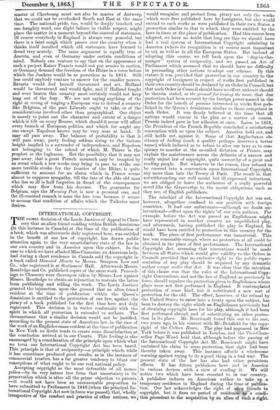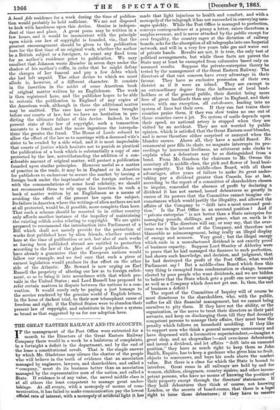INTERNATIONAL COPYRIGHT.
IIHE recent decision of the Lords Justices of Appeal in Chan- cery that an alien friend residing within British dominions (in this instance in Canada) at the time of the publication of a book, which was afterwards duly registered here, was entitled to the benefit of our law of copyright, has drawn public attention again to the very unsatisfactory state of the law in our own country and in America upon this subject. In the case to which we have alluded Miss Cummins. an American lady, had during a short residence in Canada sold the copyright in a book called Haunted Hearts to Messrs. Sampson Low and Co., who registered it at Stationers' Hall. Afterwards Messrs. Routledge and Co. published copies of the same work. Proceed- ings in Chancery were thereupon taken by Messrs. Low against Messrs. Routledge to obtain an injunction to restrain the latter from publishing and selling the work. The Lords Justices granted the injunction, upon the ground that an alien friend resident at the time of publication within the Queen's dominions is entitled to the protection of our law, against the piracy of a book published for the first time here and duly registered. This decision is in entire conformity with the spirit in which all protection is extended to authors. The circumstance that a similar decision would not be justified, according to the present state of American law, in the case of the work of an Englishwoman resident at the time of publication in New York no doubt tends to create some dissatisfaction at the conclusion arrived at in our Courts. This feeling is also encouraged by a consideration of the principle upon which what we term our International Copyright Act has been based. This principle is that of reciprocity—a principle which, while it has sometimes produced good results, as in the instance of commercial treaties, has a far greater tendency to blunt our conceptions of what ought to be our real national policy. Accepting copyright as the most defensible of all mono- polies—by its very nature free from that uncertainty in its preservation which is after all the prime objection to patents —it would not have been an unreasonable proposition to have submitted to Parliament in 1846 (when the principal In- ternational Copyright Act now in force was passed), that, wholly irrespective of the conduct and practice of other nations, we
would recognize and protect from piracy not only the works which were first published here by foreigners, but also would extend to such works as were published in their own States a protection similar to that to which they were entitled by the laws in force at the place of publication. Had this course been
adopted, we have no doubt that long ere this we should have had a real system of International Copyright snbsisting in America (where its recognition is of course most important to us), as well as in all the European States. But instead of adopting this course, we fell back upon the " dog-in-the- manger ' system of reciprocity, and we passed an Act of Parliament which assumed that we should have no difficulty in persuading other nations to adopt our scheme. By this statute it was provided that protection in our country to the copyright of foreigners in respect of works first published in their own country should be declared by an Order in Council, but that such Order in Council should have no effect, unless it should be therein stated, as the ground for issuing the same, that due protection had been secured by the foreign power named in the Order for the benefit of persons interested in works first pub- lished in the Queen's dominions similar to those comprised in such Order. It was firmly believed at the time that all nations would concur in the plan as a matter of course. Prussia indeed gave in her adhesion at once. Later, in 1851, the President of the French Republic concluded a satisfactory convention with us upon the subject. America held out, and still holds out, against it. Some of that Anglo-Saxon ob- stinacy of feeling (such a quality perhaps deserves a better name) which induced us to refuse to alter our laws as to con- spiracy to murder at the so-called dictation of France, may explain the maintenance across the Atlantic of a narrow and really unjust law of copyright, quite unworthy of a great and reading people. But whatever be the reason, they refused to be coerced into a convention upon International Copyright, any more than into the Treaty of Paris. The result is, that notwithstanding our well meant but ill expressed intentions, we are obliged to leave the authoress of a really powerful novel like the Gayworthys to the moral obligations, such as they are, of English publishers.
The mischief of the International Copyright Act was not, however, altogether confined to our position with foreign countries. It had one unfortunate—although no doubt un- intentional—effect upon the rights of our own authors. For example, before the Act was passed an Englishman might have represented in another country an unpublished play, and afterwards, having published the play in England, he would have been entitled to protection in this country for the work. The place of first performance was immaterial. This law was reasonable enough where no protection at all could be obtained in the place of first performance. The International Copyright Act, assuming that conventions would be made between all States which would give validity to the Orders in Council, provided that no exclusive right to the public repre- sentation of any play should be acquired by any dramatic author except under that Act. It was clear that the intention of this clause was that the rules of the International Copy- right Conventions, and not the law of England, as previously in force, should regulate the protection given to Englishmen whose plays were not first performed in England. It contemplated protection of some kind, but it substituted a new sort of protection for the old. The effect, however, of the refusal by the United States to enter into a treaty upon the subject, has been to destroy the right which an Englishman previously had of obtaining copyright here for his play, although it had been first performed abroad, and of substituting no other protec-
tion in its place. Mr. Boucicault found this out to his cost,
two years ago, in his contest with Mr. Delafield for the copy- right of the Colleen Bawn. The play had appeared in New
York before it was published in London, and the Vice-Chan- cellor Page Wood held that, although before the passing of the International Copyright Act Mr. Boucicault might have sustained his claim to some protection, that right had been
thereby taken away. This instance affords a wholesome warning against trying to do a good thing in a bad way. The
present state of the law has also had other pernicious effects. It has driven publishers here and in America to various devices with a view of evading it. We will notice two which have been resorted to in our country.
A publisher induces an American author to take up a temporary residence in England during the time of publica- tion. Our law acknowledges the right of friends to copyright, but it fixes no period of reside a condi-
tion precedent to the acquisition by an alien of a right. A bond fide residence for a week during the time of publica- tion would probably be held sufficient. We are not disposed to look with harshness upon this device. Genius is indepen- dent of time and place. A great poem may be written in a• few hours, and it would be inconsistent with the principle upon which our law of copyright is founded, viz., that the greatest encouragement should be given to the publication here for the first time of an original work, whether the author baa British. subject or a foreigner, to exact any fixed term for an author's residence prior to publication. We may recollect that Johnson wrote R.asselcus in seven days under the shadow of his mother's coffin, in order that he might defray the charges of her funeral and pay a few debts which she had left unpaid. The other device to which we must allude is, however, of a different character. It consists in the , insertion in the midst of some American book of original matter written by an Englishman. The work is then registered here, and the publisher hopes to be able to restrain the publication in England of any copies of the American work, although in these the additional matter may be omitted. The case has never yet been brought before our courts of law, but we have no hesitation in pre- dicting the ultimate failure of this device. Indeed, in the present state of the law of copyright, such a transaction amounts to a fraud, and the more ingenious the interpola- tions the greater the fraud. The House of Lords refused to allow the effect of the law as to marriage with a deceased wife's sister to be evaded by a side wind, and it is most improbable that courts of justice which hesitate not to punish as piratical the publication of a book which is substantially a copy of one protected by the law, notwithstanding the addition of a con- siderable amount of original matter, will protect a publication founded upon similar principles. However useful as a matter of practice in the trade, it may be in England or in America for publishers to endeavour to secure the market by issuing a foreign book under the imprimatur of the foreign author, or with the commendations of some local celebrity, we should not recommend them to rely upon the insertion in such a book of matter written by an Englishman as a means of avoiding the effect of the present law upon the subject. Its failure in America, where the writings of alien authors are not at all protected, would be,, if possible, more complete than here. That such a scheme should be resorted to in either country only affords another instance of the impolicy of maintaining the existing selfish codes relating to copyright. We are quite prepared to recommend the introduction into Parliament of a Bill which shall not merely provide for the protection of works first published here by alien friends, whether resident here at the time of publication or not, but also of such works as having been published abroad are entitled to protection according to the law of the place of their publication. We have already a guarantee that the European nations would follow our example, and we feel sure that such a piece of earnest legislation would produce its due effect on the other side of the Atlantic. Mr. Seward is now urging on Earl Rusaell the propriety of altering our law as to foreign enlist- ment, so as to bring it into accordance with that which pre- vane in the United States ; and Lord Russell has proposed to refer certain matters in dispute between the nations to a con- vention. It would surely only be paying a just homage to the service rendered by the genuine world of English letters, in the hour of darkest trial,-to their now triumphant cause of 'freedom and right, if the United States were to abandon their present law of copyright, and substitute in its place a system as broad as that suggested by us for our adoption here.



































 Previous page
Previous page